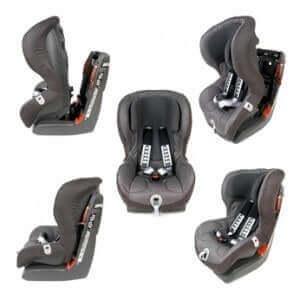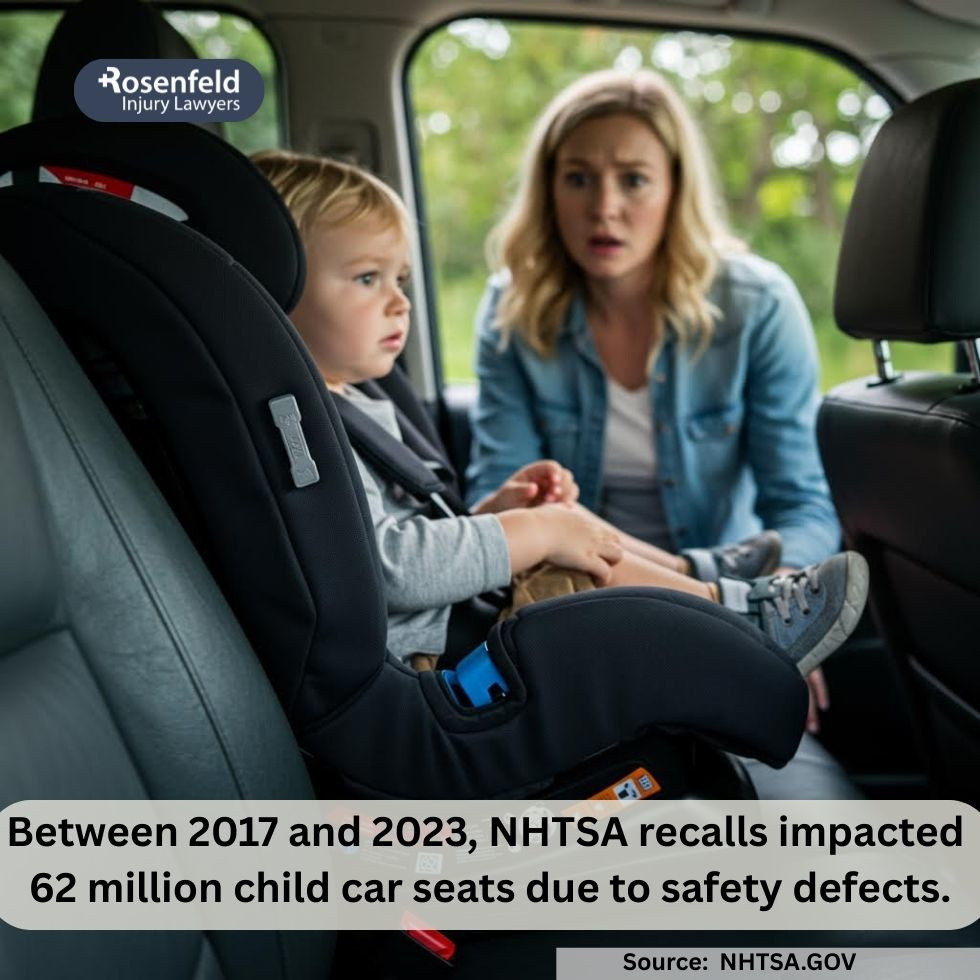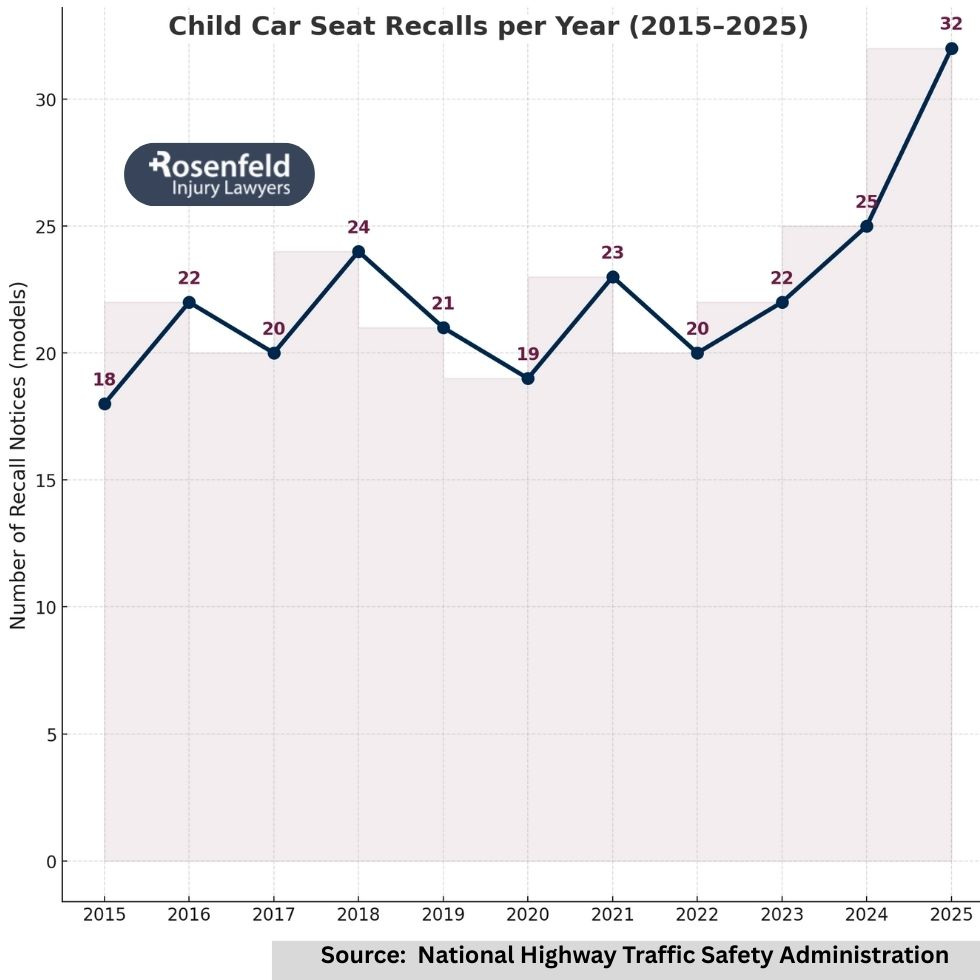- 24/7 Free Consultation: (888) 424-5757 Tap Here To Call Us
Chicago Defective Car Seat Lawyer

Seek Compensation for Children Injured by Faulty Restraints

A defective car seat lawyer can help if your child was injured because a car seat manufacturer failed their duty of care. While parents trust that these products will provide protection, a single defect, like a buckle that unlatches on impact or a seatback that collapses, can have devastating consequences.
Even though most car seats meet federal safety standards, flaws in design, poor manufacturing, or unclear instructions can turn a safety device into a serious risk. Book a free consultation to understand how a product liability lawyer can help your family seek compensation after a preventable injury.
A Brief History of Car Seat Safety Laws in the U.S.
Child car seats weren’t always required or regulated. In fact, widespread car seat laws didn’t exist until the 1970s.
The major turning point came with the National Traffic and Motor Vehicle Safety Act of 1966, which empowered the federal government to establish safety standards for vehicles and related equipment, including car seats. Soon after, the National Highway Traffic Safety Administration (NHTSA) was created to oversee enforcement.
Over the decades, federal regulations like FMVSS 213 (Federal Motor Vehicle Safety Standard 213) have shaped the design and testing of child restraint systems.
While these rules have undoubtedly saved lives, some safety experts have voiced concerns that current standards still fall short in addressing real-world crash dynamics. A single engineering oversight or poor-quality material can lead to serious injuries, even in systems deemed “compliant.”
How Do Car Seats Become Defective?
Car seats can be defective in three major ways, each falling under a different legal category in product liability law.
Design defects are flaws in the basic blueprint of the product. Even if a car seat manufacturer builds the seat exactly as intended, the design itself may be unreasonably dangerous.
Common examples include weak frame materials that crack under force, poor side-impact protection, or restraint systems that fail to secure small children properly.
With manufacturing defects, the design is sound, but something goes wrong during production. The defect may affect one unit or an entire batch.
Examples include loose bolts or misaligned harnesses, defective buckles that unlatch under pressure, or faulty plastic molding that leads to cracking or breakage.
Marketing defects involve inadequate instructions or child safety warnings. Even a well-designed and well-built car seat can become hazardous if parents are not properly informed on how to use it.
Examples include misleading labeling of age or weight limits, poor installation instructions, or failure to include warnings about positioning in certain types of vehicles.

Common Car Seat Defects
When a car seat fails, the problem often lies in one or more of its key components. Here are the parts that are most vulnerable to defect:
- Car seat tracks – These allow for adjustability but can loosen or fail in a crash.
- Seatbacks and recliner mechanisms – May collapse backward or forward, especially under rear impact.
- Headrests – Poorly secured headrests can cause neck or spine injuries.
- Harnesses and buckles – If they release during a collision, the child can be ejected or thrown.
- Latches – Faulty connectors to the vehicle can cause detachment during impact.
- Bases – Used in infant seats, defective bases may not lock in place or may break entirely.
Injuries Caused by Defective Child Car Seats
When a defective car seat fails to function as intended, the resulting injuries can be catastrophic. Some of the most common include:
- Traumatic Brain Injuries (TBI) – Often caused by ejection from the seat or inadequate head protection;
- Spinal Cord Injuries – These can result in permanent paralysis or long-term neurological damage;
- Internal Organ Damage – Caused by excessive movement or impact forces;
- Fractures – Broken bones, especially in the arms, legs, or skull;
- Whiplash and Soft Tissue Injuries – May lead to long-term pain or limited mobility.
In the worst cases, a defective seat can lead to fatal injuries, especially in rollover or high-speed crashes.
Can I Sue for Injuries Caused by a Defective Car Seat?
Yes. Families whose children were injured due to a defective car seat may have the right to pursue legal action under product liability laws. A faulty car seat lawyer can help determine who is at fault and what legal path to take.
Several parties may be responsible in these cases, such as:
- The car seat manufacturer
- Distributors or suppliers
- Retailers or sellers
- In some cases, testing labs or marketing firms
To win a product liability case, your attorney must prove:
- The seat was defective
- The defect caused the child’s injuries
- You suffered damages as a result (medical bills, emotional trauma, etc.)
The legal standard varies by state, but many states follow strict liability, meaning you don’t have to prove negligence—only that the defect existed and caused harm.

Compensation Available in a Defective Car Seat Lawsuit
Victims of defective car seat injuries may be eligible for both economic and non-economic damages, including:
Economic Damages:
- Medical bills (past and future)
- Lost wages (if a parent misses work to care for the child)
- Future medical care (surgeries, physical therapy, long-term treatment)
- Lost earning capacity (if the child’s injuries limit future employment)
Non-Economic Damages:
- Pain and suffering of the child
- Emotional distress of the child and family
- Loss of enjoyment of life
Punitive Damages:
In rare cases, if the manufacturer failed to act on known dangers or ignored prior complaints, courts may award punitive damages to punish gross misconduct. While not common, these are sometimes available in some states under egregious circumstances.
Why You Need a Defective Car Seat Attorney
Navigating a complex product liability claim requires experience, legal knowledge, and resources. A dedicated mass tort lawyer can provide:
- Deep expertise with defective car seats and product liability cases;
- Understanding of federal safety standards like FMVSS 213;
- Access to expert witnesses, including engineers, crash reconstructionists, and medical professionals;
- Skilled negotiation with insurance companies and corporate legal teams;
- Trial advocacy, if needed;
- A contingency fee basis, meaning you pay no fees unless your attorney wins the case.
The stakes are high in child injury cases, both emotionally and financially. You deserve a defective car seat attorney who will fight for the truth and your child’s future.
Contact Our Defective Product Lawyers for a Free Initial Consultation

If your child was injured by a defective car seat, we’re here to help. We’ll review your case, explain your rights, and guide you through the next steps. We work on a contingency fee basis, so you won’t owe us anything unless we recover compensation for you..
Call (888) 424-5757 or fill out our online form to book a free initial consultation.
All content undergoes thorough legal review by experienced attorneys, including Jonathan Rosenfeld. With 25 years of experience in personal injury law and over 100 years of combined legal expertise within our team, we ensure that every article is legally accurate, compliant, and reflects current legal standards.







